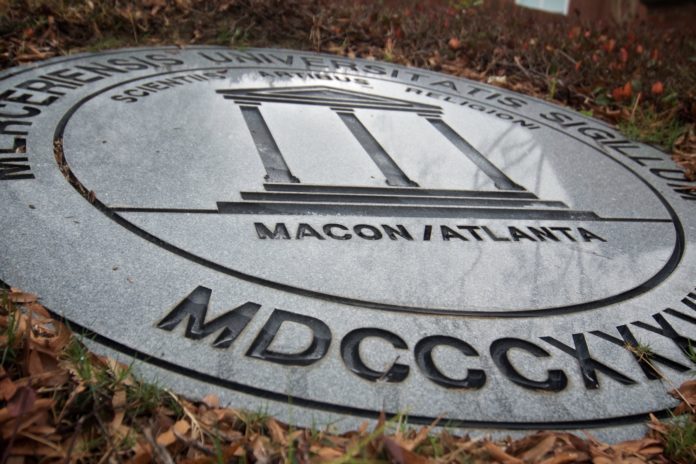MACON — The Georgia Cancer Coalition has awarded one of its six research grants for 2010 to a member of the Mercer University School of Medicine faculty. The organization will provide $50,000 to Dr. Robert J. McKallip, an assistant professor of immunology in the Division of Basic Medical Sciences at the School of Medicine in Macon, to study therapies for treating malignant melanoma.
“Mercer scientists are once again being recognized for their numerous contributions to a variety of important health issues,” said Dr. D. Scott Davis, senior vice provost for research and dean of graduate studies. “This generous funding for Dr. McKallip’s research by the Georgia Cancer Coalition will allow his group to further advance the discovery of new therapies for malignant melanoma, a particularly aggressive type of cancer. Dr. McKallip is one of our many outstanding young faculty who have been hired in recent years and I congratulate his early success for external funding in a highly competitive environment.”
Dr. McKallip will use the funding to do his initial investigation into a new method of treating malignant melanoma, a form of skin cancer that can spread throughout the body and has a poor prognosis for recovery. He will research the use of the body’s own immune cells to attack the tumors, which because they disperse throughout the body are often impossible to target with other therapies.
Using the grant funding, Dr. McKallip will investigate whether he can identify specific isoforms of the CD44 protein expressed on activated immune cells, which help the cells to track down and kill tumors. Once those specific isoforms are identified, he will enrich the immune cells that express those isoforms and return them to the patient, where they can attack the tumors more effectively. The grant will help Dr. McKallip to do the initial research and collect the data on his new therapy while laying the groundwork for future grant proposals for more exhaustive studies and the development of potential therapies.
“This grant will give me the funding to perform the critical experiments necessary to further my research and will provide the data I need for competitive proposals to the National Institutes for Health and other national grants,” Dr. McKallip said. “This is a great grant to have because it offers important support for my research and I’m grateful that the Georgia Cancer Coalition has agreed to help me further my investigation.”
The 2010 Cancer Research Awards are each one-year, $50,000 grants and mark the first time that the awards were made available to study all types of cancer. Legislation passed in 2009 removed prior restrictions to research in the areas of breast, prostate, or ovarian cancer. Reviewers included nationally-recognized scientists and clinicians from across the country. The awards are funded through a state income-tax check-off program, allowing Georgians to elect to donate $1 of their state income tax bill to fund cancer research.
“These research awards are important to our state’s scientists,” said Bill Todd, president and chief executive officer of the Georgia Cancer Coalition. “It is a testament to the growing focus on cancer research among Georgia’s clinical and research investigators. We owe the program’s success to our citizens who support the drive to eradicate cancer.”
Dr. McKallip came to Mercer in 2009, after two years in the private sector, and prior to that was an assistant professor at the University of South Carolina. He also completed two post-doctoral appointments with Virginia Polytechnic Institute and the Medical College of Virginia. He earned his Ph.D. in molecular and cellular oncology from The Georgia Washington University and his master’s and bachelor’s from Virginia Tech.
About the Mercer University School of Medicine (Macon and Savannah)
Mercer University’s School of Medicine was established in 1982 to educate physicians and health professionals to meet the primary care and health care needs of rural and medically underserved areas of Georgia. The School only accepts Georgia residents into its medical degree program. Students entering Mercer University School of Medicine will be graduated from a school that utilizes a problem-based medical education program that provides early patient care experiences. Such an academic environment fosters the early development of clinical problem-solving and instills in each student an awareness of the place of the basic medical sciences in medical practice. In August 2008, the inaugural class of 30 students began study at Memorial University Medical Center in Savannah at Mercer’s second full, four-year doctor of medicine program. The School also offers master’s degrees in public health, family therapy, family services and nurse anesthesia.
About Mercer University
Founded in 1833, Mercer University is a dynamic and comprehensive center of undergraduate, graduate and professional education. The University enrolls more than 8,000 students in 11 schools and colleges – liberal arts, law, pharmacy, medicine, business, engineering, education, theology, music, nursing and continuing and professional studies – on major campuses in Macon, Atlanta and Savannah and at three regional academic centers across the state. Mercer is affiliated with two teaching hospitals — Memorial University Medical Center in Savannah and the Medical Center of Central Georgia in Macon, and has educational partnerships with Warner Robins Air Logistics Center in Warner Robins and Piedmont Healthcare in Atlanta. The University operates an academic press and a performing arts center in Macon and an engineering research center in Warner Robins. Mercer is the only private university in Georgia to field an NCAA Division I athletic program. For more information, visit www.mercer.edu.
— 30 —










